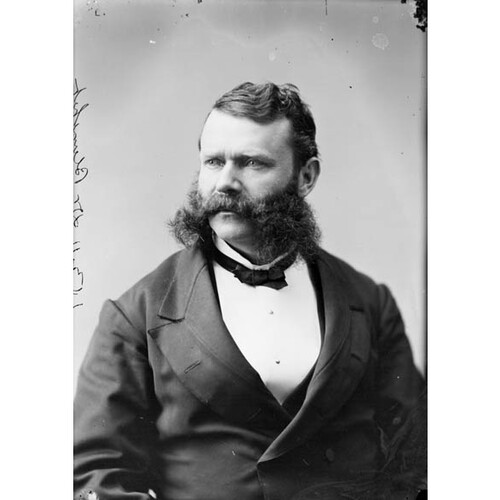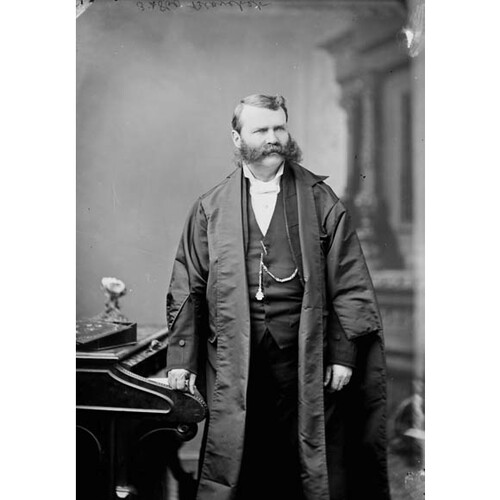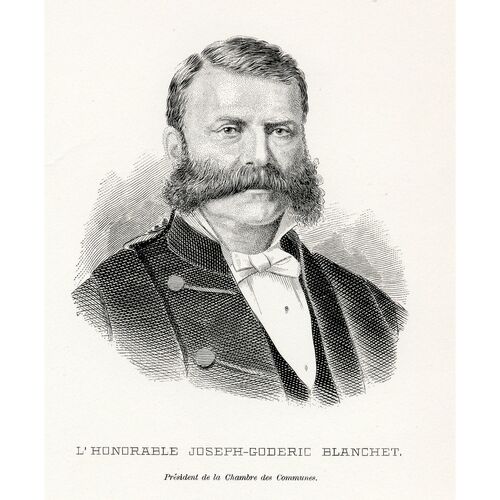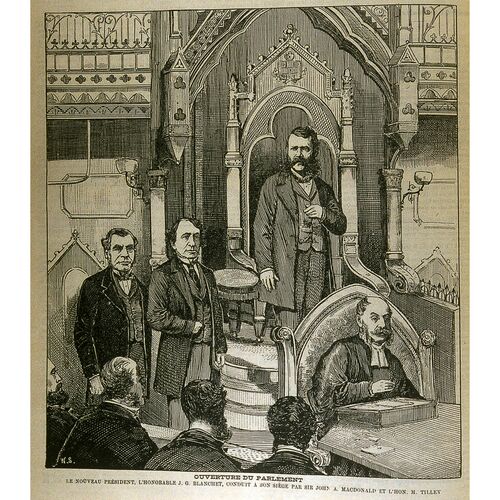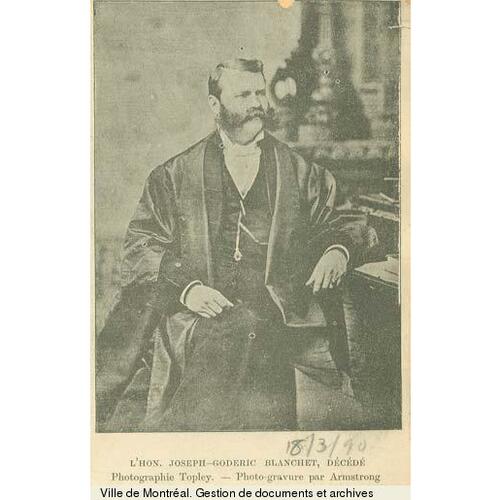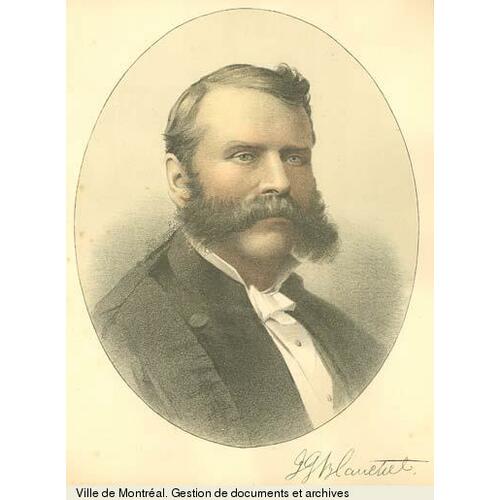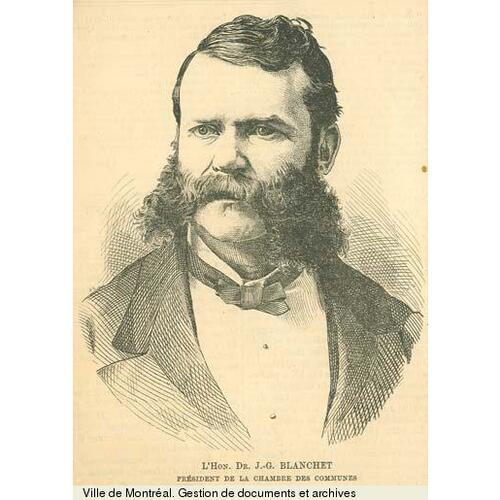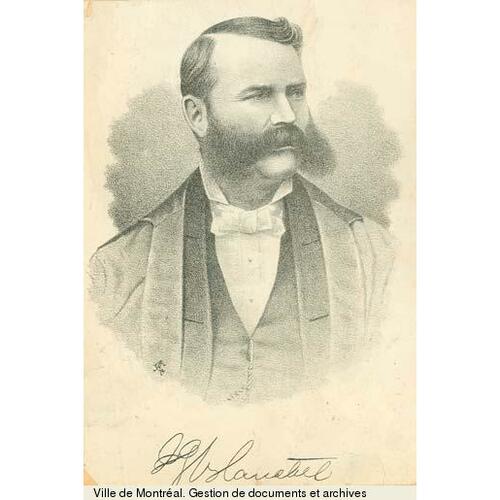BLANCHET, JOSEPH-GODRIC (Goderic), doctor, soldier, politician, and public servant; b. 7 June 1829 at Saint-Pierre-Montmagny, Lower Canada, son of Louis Blanchet, a farmer, and Marie-Marguerite Fontaine; m. 28 Aug. 1850 Émilie Balzaretti at Quebec City, and they had six children; d. 1 Jan. 1890 at Lévis, Que.
Joseph-Godric Blanchet received his secondary education at the Petit Séminaire de Québec from 1840 to 1844 and at the Collège de Sainte-Anne-de-la-Pocatière from 1844 to 1845. After training for four and a half years with his uncle, the surgeon Jean Blanchet*, he qualified as a doctor on 14 May 1850. He practised for a year at Quebec and a year at Saint-Nicolas, before settling into a practice in 1852 in the parish of Notre-Dame-de-la-Victoire (at Lévis).
Blanchet was soon initiated into politics by serving as mayor of the parish municipality of Notre-Dame-de-la-Victoire from 1855 to 1861. In this capacity, in 1857 he had several wharves, a covered market, and a market place built, and in 1861 he assisted in the incorporation of the town of Lévis. Having run unsuccessfully as a “Democratic” candidate for the Legislative Assembly in 1857, he was elected for Lévis in July 1861 as a Liberal-Conservative, was re-elected in 1863, and kept his seat until July 1867.
Conscious of the defence needs of the country and a supporter in 1862 of the Militia Bill which the assembly failed to pass, in 1863 Blanchet raised the 17th (Lévis) Battalion of Infantry and was appointed its lieutenant-colonel, retaining this post until 1884. In 1865 he took courses at the military school in Quebec City and obtained his 2nd and 1st class certificates That year he became commanding officer of the 3rd (Laprairie) Administrative Battalion after the Confederate raid on St Albans, Vt [see Charles-Joseph Coursol]. In 1866 and 1870 he was given command of the militia on the south shore of the St Lawrence to guard the eastern borders of Quebec while there was a threat of a Fenian invasion.
That confederation was conceived and brought into being by the Conservatives proved opportune for Blanchet, who in 1867 obtained both federal and provincial seats in the riding of Lévis. Furthermore, on 27 Dec. 1867 he became the first speaker of the Quebec Legislative Assembly. As speaker, his duties included attending to the assembly’s internal administration, defending its privileges, and maintaining order and dignity during debates. He also had the right to vote when the house divided equally on an issue. Blanchet exercised this prerogative twice: in 1872, when an amendment was made to a bill to secure the autonomy of the assembly, and three years later, when an amendment to an amendment was made to a bill legalizing certain notorial acts. In both instances, taking a stand opposite to that of the prime minister, he voted in favour of the proposed amendments. From 1867 to 1872 he chaired a committee whose major responsibility was to develop standing orders for the Legislative Assembly, and his familiarity with parliamentary procedure enabled him to carry out this task without difficulty. Re-elected to the provincial assembly in 1871 and to the federal parliament in 1872, Blanchet had to resign from the House of Commons in order to remain in the assembly when the double mandate was abolished by the federal government in 1873. He was again chosen speaker at the opening of the second legislature and held this office until he was defeated in the provincial election of 7 July 1875 by the sheriff of the district of Quebec, Étienne-Théodore Pâquet.
The years from 1867 to 1875 were the most active of Blanchet’s career. In addition to duties as a federal member in Ottawa and as speaker at Quebec which kept him busy for more than half the year, Blanchet continued to practise medicine and he also took an interest in both business and the cultural life of the Quebec City region. He was vice-president of the Levis and Kennebec Railway Company in 1870, and its president from 1872 to 1876 [see Louis-Napoléon Larochelle]. In 1871 he also took part in founding L’Écho de Lévis, a paper which served as his means of communication with his constituents. He belonged to a literary society, the Cercle de Québec, and was its president in 1870 and 1871. In 1873 he became a member of the Catholic committee of the Council of Public Instruction of Quebec.
After his defeat in the 1875 provincial elections he won the vacant federal seat of Bellechasse on 30 Oct. 1875. He was re-elected in 1878 and 1882 in the constituency of Lévis. Blanchet became speaker of the House of Commons on 13 Feb. 1879, and served in this office until 18 May 1882. He was the first and indeed the last parliamentarian to be the speaker at both federal and provincial levels. Blanchet resigned from the House of Commons on 4 Oct. 1883, after being appointed collector of customs for the port of Quebec. He held this post until his death in 1890.
Débats de l’Assemblée législative (M. Hamelin), [I–II]. Qué., Assemblée législative, Journaux, 1867–68. Le triomphe de Joseph-Goderic Blanchet dans le comté de Lévis: une magnifique démonstration populaire, jeudi soir, 19 septembre 1878 (Québec, 1878). Le Canadien, 27 oct. 1871, 23 oct. 1874, 3 mars 1883, 3 janv. 1890. La Minerve, 4 janv. 1890. Le Monde illustré (Montréal), 8 mars 1890. L’Opinion publique, 20 févr. 1879. Achintre, Manuel électoral. Canadian biog. dict., II. Cyclopædia of Canadian biog. (Rose, 1888). Dent, Canadian portrait gallery. J. Desjardins, Guide parl. P.-G. Roy, Profils lévisiens (2 sér., Lévis, Qué., 1948), I. Auguste Béchard, Galerie nationale: l’honorable Joseph-G. Blanchet (Québec, 1884). Le Centenaire de Notre-Dame de Lévis ([Lévis, 1950]). M. Hamelin, Premières années du parlementarisme québécois. “Les Blanchet,” BRH, 38 (1932): 735–40. “Le premier orateur de l’Assemblée législative,” BRH, 69 (1967): 63–64.
Cite This Article
Frances Caissie, “BLANCHET, JOSEPH-GODRIC (Goderic),” in Dictionary of Canadian Biography, vol. 11, University of Toronto/Université Laval, 2003–, accessed December 28, 2025, https://www.biographi.ca/en/bio/blanchet_joseph_godric_11E.html.
The citation above shows the format for footnotes and endnotes according to the Chicago manual of style (16th edition). Information to be used in other citation formats:
| Permalink: | https://www.biographi.ca/en/bio/blanchet_joseph_godric_11E.html |
| Author of Article: | Frances Caissie |
| Title of Article: | BLANCHET, JOSEPH-GODRIC (Goderic) |
| Publication Name: | Dictionary of Canadian Biography, vol. 11 |
| Publisher: | University of Toronto/Université Laval |
| Year of publication: | 1982 |
| Year of revision: | 1982 |
| Access Date: | December 28, 2025 |


![L'Honorable Joseph-Goderic Blanchet. Président de la chambre des communes [image fixe] Original title: L'Honorable Joseph-Goderic Blanchet. Président de la chambre des communes [image fixe]](/bioimages/w600.4483.jpg)
